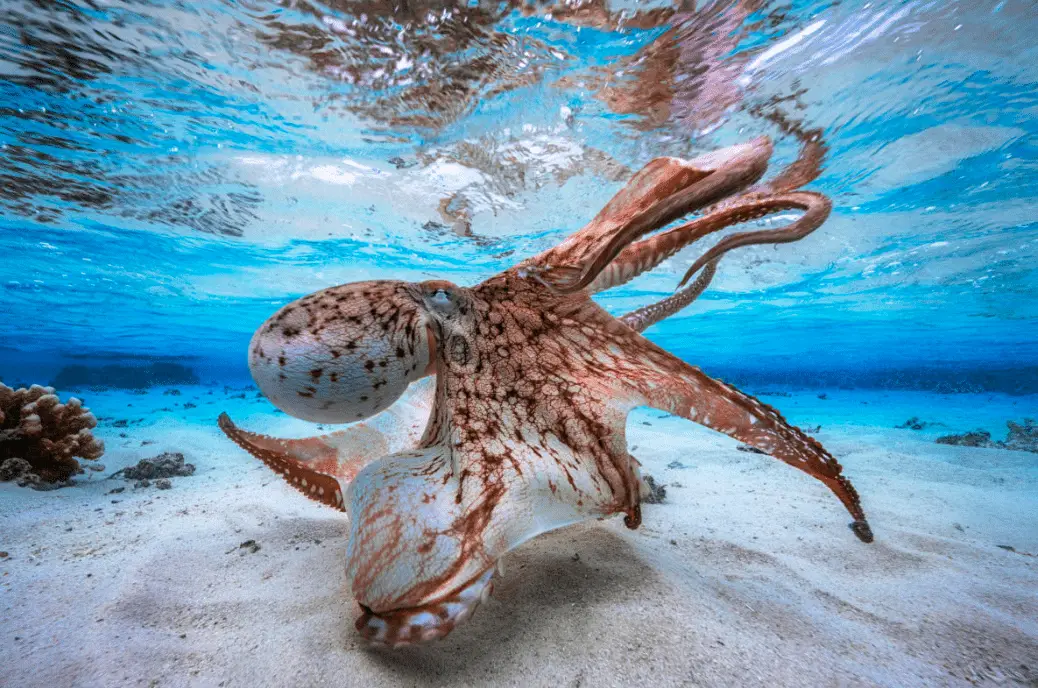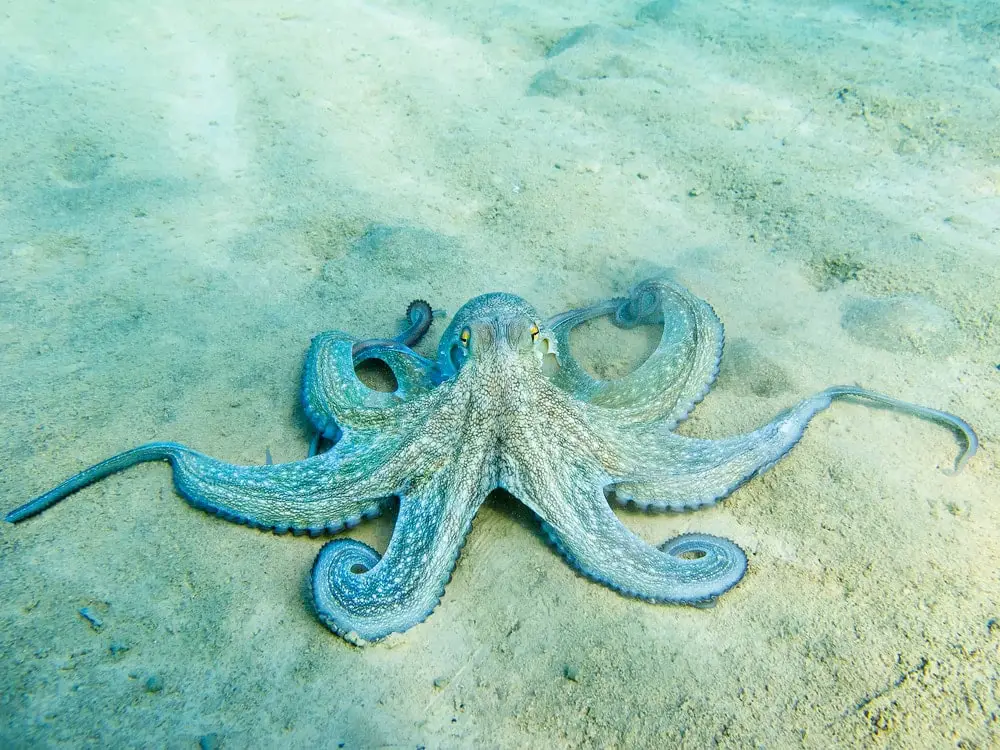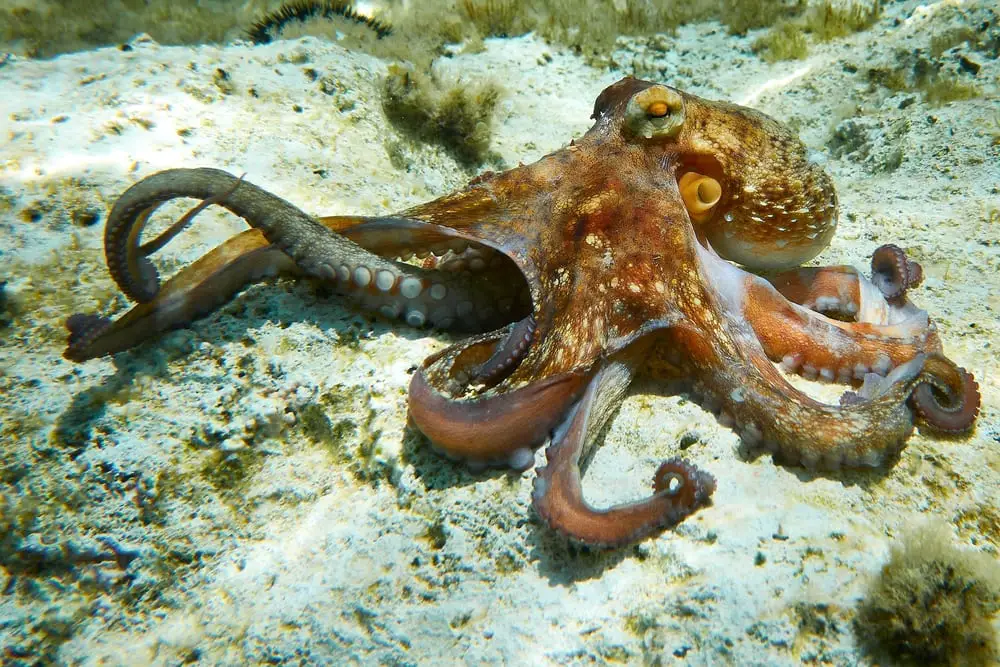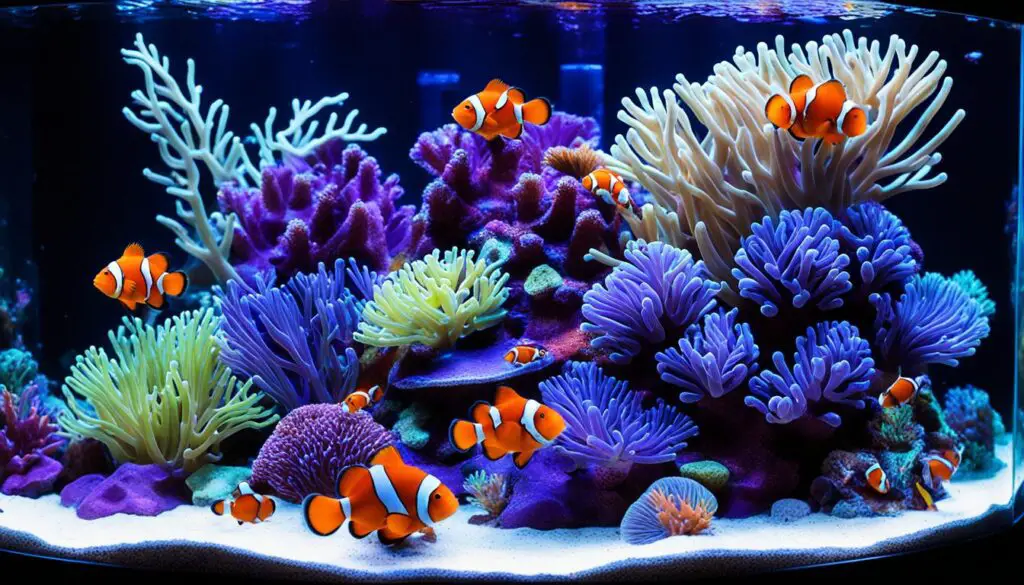How Long Do Male Octopus Live

Introduction
How Long Do Male Octopus Live: The lifespan of male octopuses is a subject of fascination and intrigue in the world of marine biology. These elusive creatures, renowned for their extraordinary intelligence and unique adaptations, have long captured the curiosity of scientists and ocean enthusiasts alike. While octopuses as a whole are known for their relatively short lifespans, typically ranging from one to two years, the longevity of male octopuses presents a compelling enigma.
Their female counterparts, male octopuses, have a comparatively shorter existence, primarily due to the demands of reproduction. Males devote the latter part of their lives to finding a mate and ensuring their genetic legacy.
This quest for procreation, combined with the physiological toll of mating and guarding eggs, often results in a tragically short life for male octopuses. However, the exact duration of their lifespan remains a matter of ongoing research and debate, as it can vary among different octopus species.
Through this examination, we aim to shed light on the factors influencing the lifespan of male octopuses, their remarkable adaptations for survival, and the significance of their relatively brief but crucial existence in the intricate tapestry of marine life.

Do male octopus live longer than females?
Depending on the octopus species, adulthood is usually reached after only one to two years. The male will seek multiple female mates. Within months of mating with a female, the male will actually die. Consequently, males do not live as long in the wild as females do.
Male octopuses generally live shorter lives than their female counterparts. The lifespan of an octopus is influenced by various factors, with reproduction being a key determinant. Females invest a significant portion of their lives in nurturing and guarding their eggs, which can last from several weeks to several months, depending on the species. This dedication to maternal care often results in a longer lifespan for females, as they protect and care for their offspring until they hatch.
In contrast, male octopuses have a different reproductive strategy. They spend much of their energy and time searching for mates and competing with other males for the opportunity to reproduce. Once they successfully mate, males may not survive for much longer, as their sole purpose is fulfilled, and they may even succumb shortly after mating.
The exact lifespan of both male and female octopuses can vary depending on species, environmental conditions, and individual circumstances. Still, as a general trend, female octopuses tend to live longer due to their extended commitment to caring for their eggs, while male octopuses often have shorter lifespans, emphasizing the different roles and strategies that exist within these remarkable marine creatures.
How long do male and female octopus live?
BLANKET OCTOPUS LIFESPAN
Males die soon after they have found a female and detach their sex arm, which is longer than their body, inside the female’s mantle. Females will continue to live and grow for many months or years longer than the males, spawn their eggs, brood their eggs, and die shortly after the eggs hatch.
The lifespan of male and female octopuses varies significantly based on several factors, including species, environmental conditions, and reproductive strategies.
In general, male octopuses tend to have shorter lifespans compared to females. Males typically live for about one to two years. Their relatively brief lives are primarily shaped by their reproductive roles. Male octopuses dedicate the latter part of their lives to finding a mate, mating, and, in some cases, guarding the eggs. Once they have fulfilled their reproductive duties, their lifespan often comes to an end.
On the other hand, female octopuses generally live longer lives. This is because they invest considerable time and energy in laying, nurturing, and guarding their eggs, which can last from several weeks to several months, depending on the species. Their maternal commitment contributes to their extended lifespan. Female octopuses may live for several years, with some tropical and deep-sea species having lifespans of up to five years or more.
It’s important to note that the lifespan of octopuses can vary greatly among different species, and there are exceptions to these general trends. Factors like predation, environmental conditions, and food availability can also influence the longevity of both male and female octopuses in the wild.
How long do octopus live if they mate?
Both the male and female octopuses only mate once in life and they die shortly after. Males go on to live a few months after mating before they die and females spend weeks diligently watching over the eggs.
The lifespan of octopuses after mating is a complex and fascinating aspect of their reproductive biology. After successfully mating, the longevity of octopuses can vary significantly depending on several factors, including the species, environmental conditions, and the specific reproductive strategies employed.
In some octopus species, males have a relatively short post-mating lifespan. Once they have fulfilled their reproductive role by transferring sperm to the female, they may die shortly afterward. This strategy is particularly common in species where males invest all their energy in mating and have no further involvement in caring for the eggs.
In contrast, females often have a more extended post-mating lifespan, primarily because they are responsible for protecting and caring for their eggs until they hatch. During this period, the female’s focus shifts from foraging and general survival to safeguarding her brood. Consequently, the female may live for several weeks to months after mating, ensuring the survival of her offspring.
Additionally, environmental factors, predation risks, and the availability of food resources can all influence how long an octopus lives after mating. Overall, the intricate interplay of reproductive strategies and ecological factors contributes to the diverse post-mating lifespans observed in octopus populations.
How long do male octopuses live?
Roughly 1 to 5 years
It varies according to species, but octopuses, both wild and captive, live roughly 1 to 5 years. This short lifespan is a consequence of a reproductive strategy known as semelparity, meaning that octopuses breed only once in their lifetime and die shortly thereafter.
Male octopuses typically have relatively short lifespans compared to their female counterparts. The duration of a male octopus’s life primarily depends on its species, environmental conditions, and reproductive behavior.
In many octopus species, males dedicate the latter part of their lives almost entirely to reproduction. They actively search for a mate, engage in complex courtship rituals, and transfer sperm to the female. Once they have successfully mated, their primary biological purpose is fulfilled, and their life expectancy often diminishes significantly. In some cases, males may die shortly after mating or shortly after their mating season concludes.
However, it’s important to note that there is variability among species. Some male octopuses may live slightly longer if they manage to mate multiple times during their reproductive phase. Additionally, environmental factors such as predation risk, food availability, and habitat conditions can also influence the lifespan of male octopuses.
In general, though, male octopuses are known for their relatively short lives, with lifespans typically ranging from a few months to a couple of years. Their brief but crucial existence is characterized by their dedicated efforts to pass on their genetic legacy to the next generation, showcasing the fascinating intricacies of reproductive strategies in the underwater world.
Do octopus eat the male?
Females often kill and eat their mates; if not, they die a few months later, too). In 1977, Brandeis University psychologist Jerome Wodinsky showed that if he removed the optic gland from female Caribbean two-spot octopuses (Octopus hummelincki), something interesting happened.
Octopuses do not typically eat the male after mating. While the world of octopus behavior can be quite complex and diverse, instances of cannibalism involving the female eating the male after mating are relatively rare and are not a common occurrence among all octopus species.
Cannibalism after mating tends to be more commonly observed in certain deep-sea and less-studied species of octopuses. In some cases, the male may offer himself as a source of nourishment for the female while she guards and cares for the eggs. This behavior may be seen as a trade-off between the male’s contribution to reproduction and the female’s need for sustenance during the extended period of egg guarding.
However, in many other octopus species, this behavior is not a regular part of their reproductive process. Octopuses have complex and varied mating behaviors and strategies, which can range from elaborate courtship rituals to sneak matings, but cannibalism is not a universal feature.
Overall, while there are exceptions, the idea that octopuses commonly eat the male after mating is more of a myth than a widespread reality, and it largely depends on the specific species and environmental conditions in which they live.
Why do male octopuses have shorter lifespans than females?
Male octopuses tend to have shorter lifespans than females primarily due to their distinct roles and reproductive strategies. The following factors contribute to the shorter lifespan of male octopuses:
- Reproductive Effort: Male octopuses invest a significant amount of energy and time in finding a mate and competing with other males for access to females. This intense focus on mating behaviors and competition can lead to physical exhaustion and increased vulnerability to predators.
- Mating and Senescence: Once a male successfully mates, it often experiences a rapid decline in health and vitality. This phenomenon is known as “senescence.” Mating can be physically taxing, and males may experience cellular damage or immune system compromise, hastening their decline.
- Limited Post-Mating Care: Unlike female octopuses, which engage in extended maternal care by guarding and nurturing their eggs, males have no involvement in this process. After mating, their contribution to reproduction is complete, and they may not have a biological incentive to prolong their lives.
- Predation Risk: Weakened and exhausted male octopuses may become easy prey for predators once they have mated and their reproductive purpose is fulfilled.
This extended parental care can lead to a longer lifespan for females, as they prioritize the survival of their offspring over their own. Overall, the different reproductive roles and strategies of male and female octopuses shape their respective lifespans, with males generally having shorter lives due to the physiological and ecological demands of their reproductive activities.
Are there any exceptions to the short lifespan of male octopuses?
There are exceptions to the short lifespan of male octopuses, and these exceptions often depend on the specific species and environmental conditions. While it’s a general trend that male octopuses have shorter lives due to their intense reproductive efforts, there are instances where this rule doesn’t hold true:
- Multiple Mating: In some octopus species, males may have the opportunity to mate with multiple females during a single reproductive season. This can extend their lifespan, as they continue to seek out and mate with additional partners.
- Extended Guarding: In a few species, males participate in guarding the eggs alongside females. In these cases, their role in protecting the developing offspring can prolong their lives beyond the typical short post-mating period.
- Longer Breeding Seasons: Some species have longer breeding seasons, providing males with more opportunities to mate and contribute to reproduction over an extended period, which can result in a longer lifespan.
- Environmental Factors: The availability of food, the presence of predators, and habitat conditions can all influence the lifespan of male octopuses. In more favorable environments with abundant food and lower predation pressure, males may live longer.
- Individual Variation: Just as in many other animal species, individual octopuses can exhibit variation in lifespan. Some males may have genetic or physiological advantages that allow them to live longer than their counterparts.
What factors influence the lifespan of male octopuses?
The lifespan of male octopuses is influenced by several key factors that play a critical role in determining their longevity. One of the most significant factors is the species of octopus itself. Different species have varying lifespans, with some living only a year or two, while others can survive for several years.
Another crucial factor is environmental conditions. Octopuses are highly sensitive to changes in their habitat, including temperature, water quality, and food availability. Adverse conditions can lead to stress and reduced lifespan, while optimal conditions can promote longevity.
Reproductive behavior also impacts male octopuses’ lifespan. In many species, males die shortly after mating. This is known as semelparity, and it occurs because males invest a significant amount of energy in mating and protecting their offspring, which can shorten their overall lifespan.
Predation is another factor that affects octopus lifespan. Octopuses are vulnerable to a wide range of predators, including larger fish and marine mammals. Their ability to avoid or escape from predators can determine how long they live.
The lifespan of male octopuses is a complex interplay of species-specific traits, environmental conditions, reproductive strategies, and predation pressures, making it a fascinating subject of study in marine biology.

Conclusion
The lifespan of male octopuses, while relatively short compared to their female counterparts, is a fascinating aspect of marine biology that continues to intrigue scientists and enthusiasts. These intelligent creatures, with their complex behaviors and unique adaptations, face a precarious balance between life and reproduction.
The consensus among researchers is that male octopuses typically live for just a year or even less, as their sole purpose becomes procreation in the later stages of their lives. This focus on mating, guarding eggs, and eventual senescence is a biological imperative critical for the continuation of their species.
While the brevity of a male octopus’s life may seem tragic, it highlights the extraordinary lengths these animals go to ensure the survival of their offspring. Their commitment to guarding and nurturing their eggs showcases the depth of their parental instincts.
Understanding the lifespan of male octopuses is not only a testament to the marvels of nature but also underscores the need for continued research into these enigmatic creatures. This knowledge can help us appreciate the delicate balance of life in the oceans and the intricate web of interactions that shape the underwater world.
In our quest to unveil the mysteries of the deep, male octopuses serve as a reminder of the intricate and often fleeting nature of life beneath the waves, inviting further exploration and admiration for the wonders of the marine realm.



